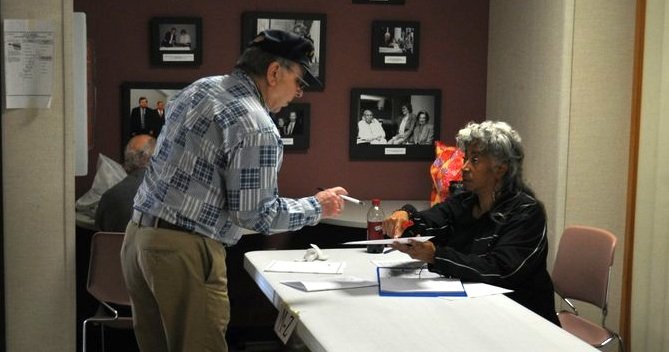Last Tuesday, 35 percent of Jackson voters said Jonathan Lee was their top choice for mayor of Jackson. Another 24 percent named Chokwe Lumumba as their choice. Problem is, only 30.7 percent of all registered voters in Jackson even showed up. Photo by Trip Burns
Last Tuesday, 35 percent of Jackson voters said Jonathan Lee was their top choice for mayor of Jackson. Another 24 percent named Chokwe Lumumba as their choice.
Problem is, only 30.7 percent of all registered voters in Jackson even showed up. The 34,652 votes cast by Jacksonians was up from 33,800 in 2009, but the percentage of registered voters who showed up was down by 4 percent.
Jonathan Lee, the biggest winner on election night, received 11,929 votes. That represents slightly less than 10.6 percent of Jackson's 112,801 registered voters. Chokwe Lumumba received just under 7.35 percent of the total possible votes.
Breaking it down by precinct, only 11 of Jackson's 89 polling locations had a 40 percent turnout or better. Only two of those received 50 percent turnout or better: Precinct 81 at Callaway High School in Ward 2 (50.8 percent) and Precinct 33 at Casey Elementary School in Ward 1 (50.6 percent).
Ten of the 89 polling locations received less than 20 percent of its possible votes. The worst offenders were Precinct 49 at the Jackson State University Student Union, where 49 out of a possible 2,282 voters (1.8 percent) chose to voice their opinion, and Precinct 89 at the Metrocenter Sears, where 131 of 980 (13.4 percent) voters turned out.
The Jackson State numbers are astounding, but the academic calendar explains the low turnout: JSU excused students following final exams April 27, nearly two weeks before primary voting.
"It's disappointing," said Corinthian Sanders, a JSU student who ran for the Ward 5 City Council seat. "It was close to the same turnout in the general elections last year. People are just not educated on the importance of voting. (Jackson State University) needs to do away with the rules about on-campus campaigning. There is a law that states the university cannot endorse one candidate over another, but it doesn't say anything about letting the politicians come on campus and engage the students."
If trends continue, low voter turnout could have a big impact in the May 21 runoff between Lee and Lumumba.
Lumumba, the current City Councilman for Ward 2, garnered more support than Lee in 56 of Jackson's 89 precincts, while Lee trumped Lumumba in just 34 precincts, with one tie. But Lee won overwhelming support from white voters, winning by 706 votes and 622 votes in Precincts 34 and 35, respectively, in Ward 1. In the four highest-percentage voting precincts, Lee drubbed Lumumba 2,087 votes to 20.
Of the 56 precincts that favored Lumumba over Lee, just 22 had more than 30-percent voter turnout.
In past Jackson elections, observers have been tempted to define mayoral candidates by race, even though most candidates for the job are usually African American. That narrative has arisen in this election too, and an analysis of precinct data pretty much affirms that the electorate in the current election is as racially polarized as ever.
Based on Census tract data used to draw voting-precinct lines, Precinct 34 in Ward 1 has the highest proportion of white voters in the city, at 99 percent. In that precinct, Lee carried just over 90 percent of the vote. Lee's next closest competitor in the precinct was incumbent Mayor Harvey Johnson Jr., who garnered 6.3 percent of the vote.
That trend continues through the 11 precincts with the largest percentages of white voters, all of which are located in northeast Jackson. In these precincts, which average 1 percent to 15 percent African American voters, Lee captured an average of 79.6 percent of votes, compared to 11.2 percent for Johnson and 3.4 percent for Lumumba.
Lee did poorly as the percentage of black voters increased, however. In the top 11 solidly black voting precincts, which range from 100 percent to 96 percent African American, voters chose Johnson or Lumumba over Lee.
In Ward 3 precincts 23 and 31, both of which are 100 percent black, Census data show, Lumumba bested Lee and Johnson, receiving 30 percent and 37 percent of votes, respectively.
On average, Lumumba received 31.3 percent of the 11 precincts with the highest proportion of voters. In these same precincts, Johnson received an average of 25.1 percent and Lee, 22.3 percent.



Comments